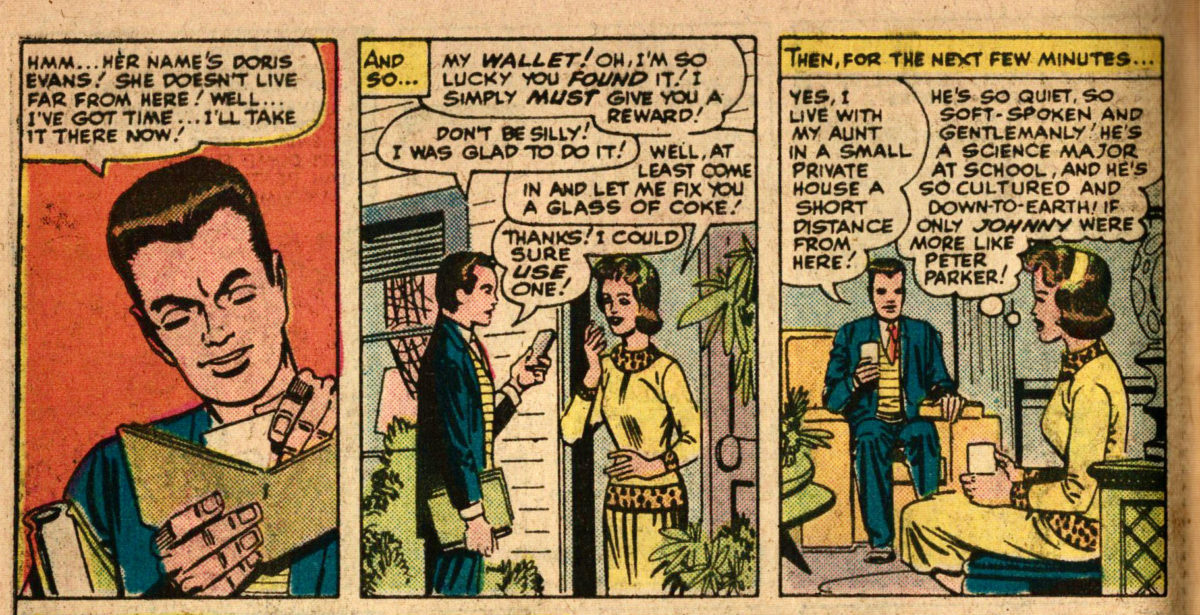Featuring: Watcher
Release: March 10, 1964
Cover: June 1964
12 cents
Story plot by: Stan Lee
Script + Art by: Larry Lieber
Inking: Chic Stone
Lettering: Art Simek
5 pages

As I mentioned in the last post, this is the first comic in our reading I actually own an original copy of. This story is the reason I have it. I had the Iron Man story already in the Essential Iron Man and Iron Man Omnibus. But at the time, nearly 20 years ago, I couldn’t find the Watcher story anywhere else. So I tracked down the original comic, shelling out several dollars for it, maybe as much as 7 or 8. Definitely more than the 12 cents it should have cost.
The Watcher is unusually passionate at the moment. I think of him as more reserved. Here, he plans to stick to his oath, but it torments him.
That makes me think this tale is set in very ancient times. The modern Watcher is a little more accepting of his role, and this tale takes place in his youth, when he struggled a bit more with his oath.
As I’ve expressed before, the Watcher’s conclusions about morality are wrong. It’s better to act. That said, they fascinate me. Especially stories like this that attempt to explore the morality of his oath.
A radioactive waste cloud is hurtling toward a planet; it will destroy the entire world. The Watcher could stop it. Should he? His oath says no. Conventional morality says yes.

Turn the page and it turns out a supernova sent another planet heading toward the same world and it collided with the cloud and they stopped each other. The world was saved. The Watcher had not the power to stop both disasters, so not acting produced the better consequences.

I’d like to look elsewhere in pop culture to reflect on the ethics of consequentialism.
First, let’s talk about Tolkien, as he writes in The Lord of the Rings when Gandalf explains why Bilbo was right to spare Gollum’s life.
Many that live deserve death. And some that die deserve life. Can you give it to them? Then do not be too eager to deal out death in judgement. For even the very wise cannot see all ends.
J.R.R Tolkien, The Lord of the Rings

Then let us look to Watchmen, written by Alan Moore. Ozymandias had just slaughtered a large percentage of Manhattan in the name of a greater good. His efforts seemed successful. He appears to have saved far more lives than he took. His argument is one still today given in defense of dropping nuclear bombs in Japan. He says, “I did the right thing, didn’t I? It all worked out in the end.” Dr. Manhattan replies, “‘In the end’? Nothing ends, Adrian. Nothing ever ends.”

Ozymandias’ plan is not to dissimilar from many a super-villain. The Batman villain Ra’s Al Ghul often plans mass slaughter in the name of some nebulous greater good. Looking to cinematic adaptations of comics, the movie version of Thanos sought to kill half of all people in the service of some greater good.


Ozymandias, Ra’s Al Ghul, and Thanos are generally recognized as villains. Their takes are the opposite of the Watcher, but the flaws in their thinking come to the same truths. The villains think they can predict the ends, and act in accordance with what will produce the best consequences. The Watcher recognizes he cannot predict all ends, and so refuses to act, for fear of the consequences.
Gandalf has it right. We cannot know the consequences of our actions; we can only do our best. We should act rightly.
There is a final flaw in the thinking of the Watcher, to believe inaction is a choice without moral consequence. I turn to Neil Gaiman to explain in his seminal work, Sandman.
Our existence deforms the universe. That’s responsibility.
Neil Gaiman, Sandman

“…the fates always know best!” says the Watcher.
Rating: ★★★☆☆, 50/100
Significance: ★★☆☆☆
Characters:
- Watcher
Story notes:
- Recap of last issue.
- Watcher sends electro-image to investigate danger.
- Alien race shoots atomic waste into space, knowing it may harm another world. They aim for a remote part of space.
#199 story in reading order
Next: Tales of Suspense #55
Previous: Tales of Suspense #54


